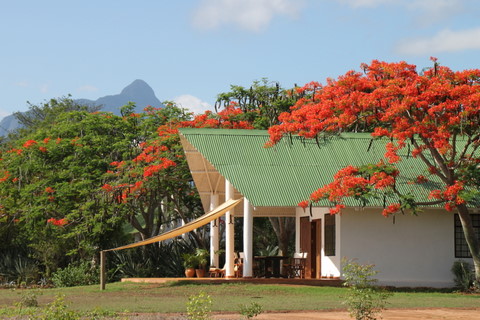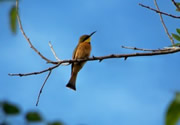About Us – Kimango Farms and the Axmann Family
Kimango Farms is owned and operated by the Axmann Family – Kim and Simone and our two sons, Janush and Julian. This is our story.
Simone and I always wanted to live and work in the tropics, so in 1990 after finalizing our studies in agricultural engineering we decided to move to Tanzania where my parents were posted at the German Embassy.
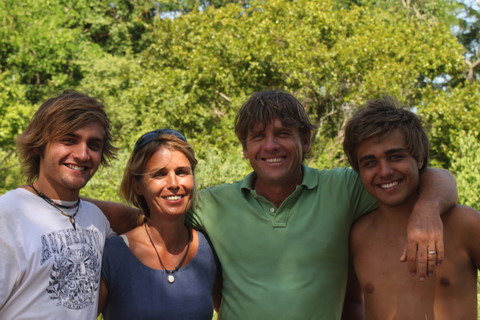
Janush, Simone, Kim and Julian
It took us two years to find suitable land, register our new company Kimango Farm Enterprises Ltd. and sort out all the necessary paper work. In 1992 we began to establish Mbuyuni Farm near Kingolwira Village in Morogoro District. Land was cleared and roads were constructed, and soon we started with first cultivation trials of various crops, ranging from avocado to zucchini. We rented a house on the neighbouring sisal estate where we lived for the first five years. As our crops grew, so did our family.
In November 1992 our first son Janush Amani was born. Julian Bahati followed in March 1995. Both boys grew up on the farm and later schooled in Morogoro International School.span>
Meanwhile, we started exporting hibiscus tea on a small scale while waiting for our mango and lime trees to grow and produce. Hibiscus became our main crop until 1998 when prices dropped due to an increased supply from West Africa. Lemongrass was to become an important addition to our herbal tea line and later we further diversified into spices, with chili and paprika becoming the main crops.
As part of our organic approach, we left bush strips and planted hedges between all cultivated plots. We also set aside 40% of the total farm area of 350 hectares as an ecological reserve. Over the last 15 years we have planted more than 20.000 trees – mainly Neem, White Teak, Teak, and African Blackwood.
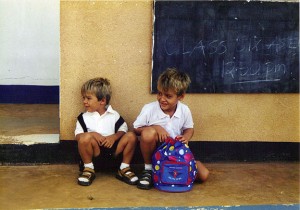
School days in Morogoro.
In 1997-8 we built our house and finally moved to Mbuyuni Farm where we live today. Our office remained a small rented room in town as we had no power or telephone on the farm yet. In 2000 we built a small bridge across the river and decreased our commute to town from 45 minutes to 20 minutes. Later, we were connected to phone and internet services which has made life much easier.
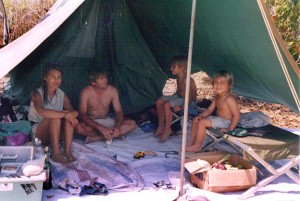
Simone, Kim and the boys on safari in the Selous Game Reserve
Tanzania had become our home and whenever time allowed we went on safari, camping in and around the national parks of Tanzania. Longer safaris led us to Kenya, Zambia, Malawi, Botswana, South Africa and Namibia.
The boys were growing up, and as teenagers it became time for them to move on. It was a tough decision for all of us, but our great little school did not have a secondary unit in those days and socially Morogoro did not really offer enough either. So they left to boarding schools – first Janush attended St. Andrews inKenya before moving to Europe where he finalized his schooling at the Tourism School in Bad Ischl, Austria, and then studied Environmental Studies at the University of Greifswald in Germany. He is now the camp manager of our Mkomazi Wildnerness Retreat.
Julian followed a couple of years later with a year in Germany to catch up on his mother tongue followed by two years at the International School Moshi, and then did his IB at the International School of Berlin. He then studied Environmental Studies at the University of Victoria in Canada, BC. and now runs BC Spaces for Nature, a not for profit organisation protecting Canada’s last virgin forests.
In 2008, we decided to start a small eco-tourism project on Mbuyuni Farm by constructing four0 comfortable cottages. We are enjoying this new business and have already met a lot of very interesting people. Please visit our page “Mbuyuni Farm Retreat” for details and photographs.
In 2023 we opened Mkomazi Wildneress Retreat. Please visit the site www.mkomaziwilderness.com
Our motivation for this organic farming project has always been the aim to grow healthy foods in harmony with the environment, and to promote organic farming in our region. Organic, sustainable farming for us means improving our soils in the long term, while producing enough income to provide a decent living for us and our employees. Most of our small and dedicated team of staff have been working with us for more than 15 years.
In 35 years what initially started as our African adventure has become a home to our family and a viable business.

